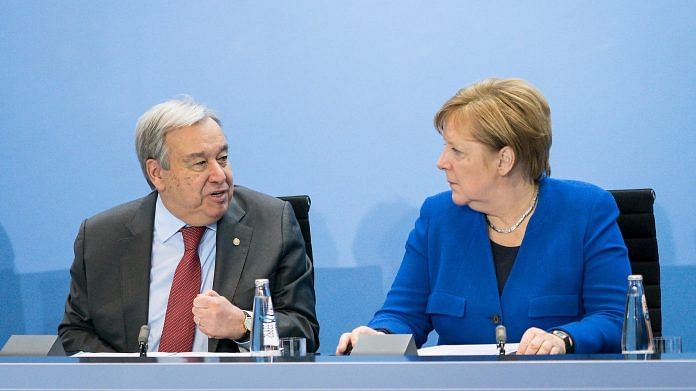New Delhi: In an effort to negotiate a political settlement in war-torn Libya, several world leaders pledged that they will not interfere in the conflict and also agreed to uphold the UN arms embargo.
German Chancellor Angela Merkel made the announcement Sunday at the peace summit in Berlin. Leaders from Russia, France, United Kingdom, Germany and Turkey participated in the summit.
“We reached an agreement on a comprehensive plan to support a ceasefire in Libya,” said Merkel. “We all agree that we should respect the arms embargo and that the arms embargo should be controlled more strongly than it has been in the past”.
However, most leaders seemed to indicate that an official ceasefire agreement was still a far-fetched idea.
Libya has been wracked by conflict since 2011 after an uprising ousted leader Muammar Gaddafi. The two warring factions in the country include the UN-backed Government of National Accord (GNA) and the forces of former military commander General Khalifa Haftar.
What did the Berlin peace negotiations achieve?
“Several major powers signed a landmark agreement to limit foreign interference in the war in Libya and to push warring factions in the troubled North African nation towards a peaceful end to fighting,” noted Al Jazeera.
Russia, Turkey and Egypt have provided various kinds of military assistance to different factions. Most recently, Ankara sent troops to Libya and its stated goal was to enforce a ceasefire in the country.
“Reports of arms, troops, and cash flooding into Libya from foreign allies in recent months have led to concerns that both sides would attempt to pursue a military victory, leading to spiraling violence,” added Al Jazeera.
In this context, the agreement to enforce an arms embargo is being seen as a major breakthrough.
However, according to various analysts, it is still a “gentleman’s agreement” and lacks any form of enforcing mechanism, raising questions about its future sustainability.
Both Haftar and GNA’s Prime Minister Fayez al-Sarraj attended the summit but did not participate in a direct meeting or the multi-party talks.
Ceasefire still nowhere in sight
Even with peace talks underway, there have been reports of air strikes and shelling in the capital city, Tripoli. Meanwhile, Haftar’s forces have shut down a number of key oil fields and ports.
Oil has been the sole driver of Libya’s economy, and according to analysts, Haftar’s drive to shut down the ports and oil fields might be a means to signal his strength.
“For any progress to be made in the long term, Libya’s warring sides will need to declare and commit to a ceasefire, which still looks far-fetched,” remarked BBC’s Rana Jawad.



